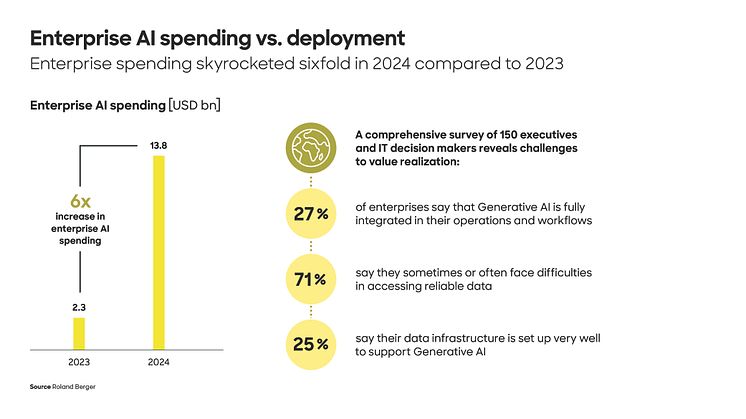
Press release -
Roland Berger study: Many companies fail to adopt AI in their processes in spite of massive investments
- Investments have increased sixfold since 2023, but only 27% of organizations have fully integrated Generative AI in their operations and workflows.
- Key challenges revolve around data quality and management, problems integrating AI in existing systems, and the talent scarcity
- The solution lies in a dual-pronged strategy: Adopting customized AI applications while systematically building data foundations to generate competitive edge
Munich, May 2025: Enterprise spending on artificial intelligence (AI) jumped sixfold from 2023 to 2024 to almost USD 14 billion, but so far only a little over a quarter (27%) of companies have fully integrated AI in their operations and workflows. This is the key finding of the study "The Data Imperative", for which Roland Berger surveyed 150 executives from the technology/IT services, healthcare/pharmaceuticals, retail/consumer packaged goods, financial services and manufacturing industries across five European countries. Asked about the key challenges involved in implementing AI projects, 28% of respondents cited issues with data, 25% referenced the complexity of integrating AI use cases, and 15% mentioned the difficulty of finding enough AI and data experts. One of the study's conclusions is therefore that having a systematic dual-pronged strategy is fundamental to successfully deploying Generative AI.
"The full potential of AI can only be unlocked by bringing together structured and unstructured data in context across enterprise processes," says Edeltraud Leibrock, Global Managing Director at Roland Berger. "Semantic graphs as meta-layers allow us to do exactly that: They create a dynamic and interpretable basis of data that supplies agent systems with contextual understanding, and this is what makes real end-to-end automation possible."
To be included in the survey, companies had to at least have experimented with Generative AI use cases and have more than 250 employees. The key barrier to implementing Gen AI projects, according to 28% of respondents, lies in data-related challenges: from issues with accessing and managing high-quality data to problems around data privacy. Particularly the healthcare/pharmaceuticals and retail/consumer packaged goods industries have difficulty accessing reliable data, whereas half of respondents in the technology and IT services industry claim to never or rarely encounter problems with data quality.
As another challenge, 25% of survey participants say they have trouble integrating AI models with their existing systems and workflows. Following some distance behind, further issues include the talent scarcity (cited by 15% of respondents), ethical concerns (12%) as well as financial constraints and trust challenges relating to customers and stakeholders (10% each).
Competitive advantages through a dual-pronged strategy
The study reveals that organization setup matters: Companies with dedicated data teams (41% of respondents) demonstrate higher AI readiness and greater implementation success than those that merely integrate data management in broader roles (49%). Furthermore, 93% of executives in the study believe AI implementation in turn improves data management practices, suggesting that the path to AI success requires both data foundation building and AI adoption.
"With a focus solely on long-term data strategies, companies risk falling behind their industry peers. Equally, if they seek only quick successes with Gen AI, they will soon reach the limits of their data foundations," says Manuel Schieler, Partner at Roland Berger. "The key to success lies in intentionally striking a balance between adding immediate value and building strategic data foundations."
Topics
Categories
Roland Berger is one of the world's leading strategy consultancies with a wide-ranging service portfolio for all relevant industries and business functions. Founded in 1967, Roland Berger is headquartered in Munich. Renowned for its expertise in transformation, innovation across all industries and performance improvement, the consultancy has set itself the goal of embedding sustainability in all its projects. Roland Berger generated revenues of around 1 billion euros in 2024.



